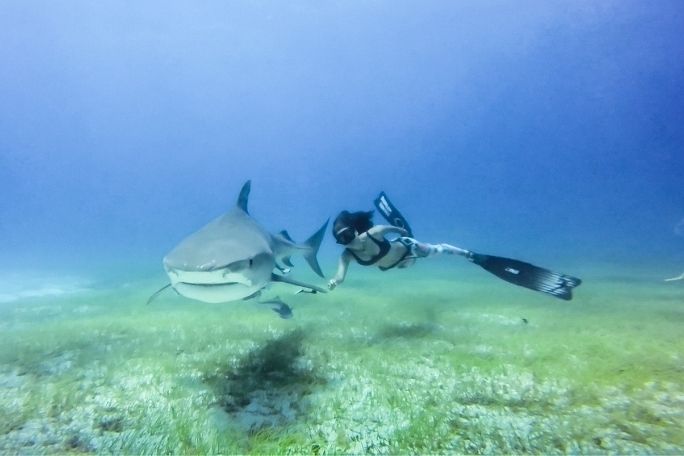Lesson summary
This lesson incorporates clips from Blue The Film as learning inspiration. Students explore the role of sharks in the ocean and consider why sharks are important for the health of our oceans ocean. They begin by conducting prior knowledge interviews with each other to share what they already know, and think, about sharks. They are then asked to participate in a class-wide reading exercise to learn more about sharks and how people use them. They then investigate the reasons why sharks are under threat, and work to create an ‘action shark’ to share ideas on how we can help sharks.
Learning intentions:
Students will...
- understand the role that sharks play in our oceans
- recognise that sharks are under threat from human behaviour and identify actions we can take to help sharks.
Success criteria:
Students can...
- identify what an apex predator is
- identify the names of two or more shark species
- understand how fishing is impacting on sharks in the world
- understand why shark finning is an unsustainable fishing practice
- create a visual art piece to share their ideas
- present their artwork to the class.
Lesson guides and printables
Lesson details
Curriculum mapping
Australian Curriculum content descriptions:
Year 3 Science:
- Living things can be grouped on the basis of observable features and can be distinguished from non-living things (ACSSU044)
- Science knowledge helps people to understand the effect of their actions (ACSHE051)
Year 4 Science:
- Living things have life cycles (ACSSU072)
- Living things depend on each other and the environment to survive (ACSSU073)
- Science knowledge helps people to understand the effect of their actions (ACSHE062)
Year 3 English:
- Draw connections between personal experiences and the worlds of texts, and share responses with others (ACELT1596)
- Read an increasing range of different types of texts by combining contextual, semantic, grammatical and phonic knowledge, using text processing strategies, for example monitoring, predicting, confirming, rereading, reading on and self-correcting (ACELY1679)
Year 4 English:
- Discuss literary experiences with others, sharing responses and expressing a point of view (ACELT1603)
- Read different types of texts by combining contextual, semantic, grammatical and phonic knowledge using text processing strategies for example monitoring meaning, cross checking and reviewing (ACELY1691)
Syllabus outcomes: ST2-10LW, ST2-11LW, EN2-11D, EN2-4A.
General capabilities: Critical and Creative Thinking, Literacy.
Cross-curriculum priority: Sustainability OI.2.
Relevant parts of Year 3 Science achievement standards: Students group living things based on observable features and describe how they can use science investigations to respond to questions.
Relevant parts of Year 4 Science achievement standards: Students describe relationships that assist the survival of living things and sequence key stages in the life cycle of a plant or animal. They identify when science is used to understand the effect of their actions.
Relevant parts of Year 3 English achievement standards: Students read texts that contain varied sentence structures, a range of punctuation conventions, and images that provide extra information.
Relevant parts of Year 4 English achievement standards: Students fluently read texts that include varied sentence structures, unfamiliar vocabulary including multisyllabic words.
Unit of work: Blue The Film: Inquiry – Years 3 & 4.
Time required: 80 mins.
Level of teacher scaffolding: Medium – oversee activities and lead discussions.
Resources required
- Student Worksheet – one copy per student
- Device capable of presenting a website to the class
- Sharks At The End Of The Line (pages 6-9 either printed or projected for students to read)
- Art materials
Skills
This lesson is designed to build students’ competencies in the following skills:
- Communication
- Creativity
- Community engagement
- Problem solving
- Global citizenship
Additional info
Blue is a feature documentary film charting the drastic decline in the health of our oceans. With more than half of all marine life lost and the expansion of the industrialization of the seas, the film sets out the challenges we are facing and the opportunities for positive change. Blue changes the way we think about our liquid world and inspires the audience to action. Find out how to screen or download the film here. Along with the film is an ambitious global campaign to create advocacy and behaviour change through the #oceanguardian movement. To become an ocean guardian, see the website.


Welcome back!
Don't have an account yet?
Log in with:
By signing up to Cool.org you consent and agree to Cool's privacy policy to
store, manage and process your personal information. To read more, please see
our privacy policy here(Opens in new tab).
Create your free Cool.org account.
Many of our resources are free, with an option to upgrade to Cool+ for premium content.
Already have an account?
Sign up with:
By signing up to Cool.org you consent and agree to Cool's privacy policy to
store, manage and process your personal information. To read more, please see
our privacy policy here(Opens in new tab).